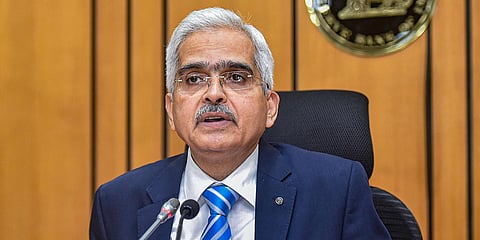

After days of holding itself back, the RBI finally threw everything but the kitchen sink to mitigate the adverse effects of Covid-19 pandemic.
The central bank has reduced key policy rates and is infusing Rs 3.74 lakh crore liquidity, but the Friday's bazooka includes a 3-month moratorium on all term loans including home loans EMIs.
For companies, the central bank decided to defer interest payments on working capital loans for three months, and as a bonus, these delayed payments won't lead to asset classification downgrades.
That said, the RBI was candid admitting that its previous GDP projections were at risk (read will be missed), and given the uncertainty, it has refrained from forecasting short-term growth and inflation estimates at least until the dust settles down.
Ripping his own rulebook, Governor Shaktikanta Das summoned an out-of-turn meeting of the Monetary Policy Committee, which despite a 4-2 vote split, went for a 'whatever it takes' approach to rate cuts.
First up, the benchmark repo rate is reduced by a 'sizeable' 75 bps and now stands at 4.4 per cent. One can expect lower interest rates and EMIs, but put the champange back on ice. A rate cut isn't a vote of confidence in the country's future, but it's RBI's way of saying things are getting worse, and the economy is heading into an unknown growth slump. So brace up for tough times ahead.
Should banks pass on Friday's 75 bps with immediate effect, home and auto loans will fall to a rock bottom of sub-7 per cent. But, as Finance Minister Nirmala Sitharaman urged, banks must first ensure faster rate transmission.
The central bank also reduced reverse repo rate by 90 bps, hoping it will discourage banks from sitting on funds and instead go out and lend. The Cash Reserve Ratio (CRR), the percentage of deposits banks keep with RBI, too is chopped by 100 bps to 3 per cent, which makes Rs 1.37 lakh crore available for banks to step up credit offtake.
But the 21-day lockdown is practically grinding the economy to a halt and its unclear if borrowers will queue up at banks for fresh funds. As history tells us, credit growth isn't entirely driven either by low rates or capital availability.
Continuing with RBI's unconventional liquidity tools, Das vowed to carry on with targeted long-term repo operations for up to Rs 1 lakh crore of three year tenors at 4.4 per cent interest. The central bank also raised marginal standing facility from 2 per cent of SLR to 3 per cent with immediate effect, which will release additional funds. Besides, Das also deferred capital conservation buffer for banks and permitted them to deal in offshore NDF market -- all sending a key message to banks and borrowers: access to capital remains as free as sunshine.
The surprise RBI dole caught markets offguard. If benchmark indices shot up minutes after the rate cut announcement, they soon slipped into the red, while the 10-year bond yields dropped as much as 3.9 per cent -- the largest ever dip seen in the past one year.
Meanwhile, flagging macroeconomic risks on both demand and supply side, Das said the need of the hour was to do 'whatever it takes' to shield domestic economy from the pandemic. "While India has locked down economic activity, financial markets are under severe stress...Priority is to take strong and purposeful action to minimise adverse macroeconomic impact of the pandemic," he said.
On inflation, while Das hoped summer months will see price stability, inflation prints of January and February were already 30 bps above RBI's estimates.
Stating that finance was the lifeline of the economy, Das subtly hinted the need for strong fiscal measures critical in dealing with the situation. He reiterated that India's banking system was 'safe and sound' and that RBI will continue its vigilance.
In sum, Friday's decisions don't appear to be a one-time affair as Das said, both conventional and unconventional steps are on the table and RBI will unleash further monetart arsenal if the situation so demands.